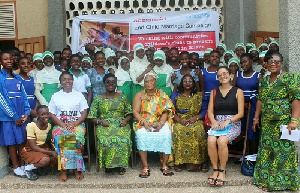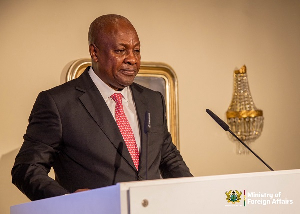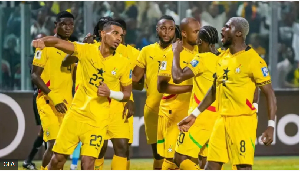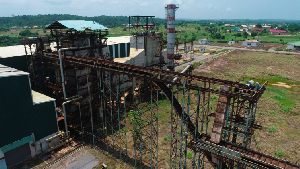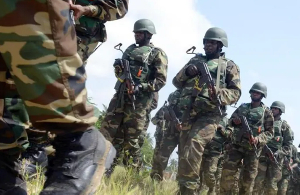She woke up looking sombre in the early hours of the morning as if angered by an incident that must have occurred the previous night. She had indeed been told by her father to prepare for marriage the next day.
It was one of her worse moments albeit she had stubbornly resisted previous suggestions and attempts by her father to marry her off in her teens.
She gasped and sighed even before she could begin her narration. There was something unusual in her voice – although steady and almost trembling, it was deep with fury and of a quality beyond speech. Her facial expression, even, reflected her ordeal.
Like many young girls in communities in Ghana with dreams of having an education, a good career and getting married when the time is rife, Jennifer (not her real name), a 12 year old class six pupil had these ambitions and hopes nearly dashed because she had been forced into marrying a man old enough to be her father.
Efforts by her mother, who frowned on the idea but was handicapped, yielded no results as her father – a crop farmer unperturbedly forced her into marriage. That singular act, she said eluded her conscious grasp as she least expected such misguidedly vicious act by her father.
Sharing her ordeal in an interview on the sidelines at a girls’ club fair organized by ActionAid Ghana in Ashaiman, Jennifer said she stayed in the marriage for nearly five months until she couldn’t bare the pain any longer.
“Imagine the growing sorrow, disgust and hate for the man I called my husband and relishing to be in school again, made me all the more anxious and longing for an escape”, she added.
ActionAid’s intervention
But for the intervention of ActionAid Ghana through its “End Child Marriage” project, Jennifer would have continued to stay with a man who violated and curtailed her rights and abused her sexually as result of his dulled sensibilities to her plights – “ActionAid rescued me and put me back in school”.
ActionAid Ghana, a Child Rights Non-Governmental Organisation in 2010 identified child marriage as a human right violation and a development challenge through its work with community volunteers, called, Community Based Anti-Violence Team (COMBAT).
Through COMBAT, 126 school girls from 57 communities in the Upper West Region were rescued from child marriage and sent back to school to continue their education in 2014.
The Children’s Act, 1998 (Act 560) defines a child as a person below the age of 18 years and also sets the minimum age for marriage at 18.
According to the Multiple Indicator Cluster Survey (MICS) 2011, in Ghana, one in four women representing 27 per cent married before the age of 18.
Child marriage has increased nationwide from 25.9 per cent in 2006 to 27 per cent in 2011.
Impact of Child Marriage
In Ghana, the practice of child marriage, a human rights violation is real and pervasive, in spite of the various local and international laws instituted to prevent it's widespread.
Early marriage does not only endanger the personal development and overall well-being of girls, it threatens their lives and ultimately pose as a development challenge to government.
It is a well-known fact that systems that undervalue the contributions of girls and women, limit their own possibilities for growth, stability and transformation.
Girls suffer limitless challenges and abuses as result of child marriage, and often at an age where they need friends and family for effective psychological and social development, their childhood is cut short abruptly as their freedoms are curtailed not only by their husbands, their parents and the society for facilitating their own kind's torture.
Girls are often helpless and deprived of their fundamental rights to health, education and safety when they are sent on such missions unprepared. This destroys them, leaves them in misery and psychologically damage their instincts for social living. Even worse, girls die out of health complications from pregnancy and childbirth and their future prospects are truncated.
SDGs and Child Marriage
Girls are at the heart of sustainable development, and the 2030 agenda of the Sustainable Development Goals (SDGs) – a set of 17 goals which outline the world’s development priorities - gives that expression.
Goal five Target of 5.3 of the SDGs calls on all to “Eliminate all harmful practices, such as child, early and forced marriage and female genital mutilation (FGM)".
This internationally outlined objective re-echoes ActionAid Ghana’s unwavering commitment to contribute to the elimination of child marriage in Ghana and to give young girls like Jennifer a new lease of life through education and skills training at all levels.
“End Child Marriage” Campaign
ActionAid Ghana with funding from UNICEF in 2015 launched the “End Child Marriage” project being implemented in 120 communities in four regions. Namely; the Upper East, Upper West, Brong Ahafo and Greater Regions, where child marriage is most prevalent.
The project, which seeks to reduce social-cultural practices that facilitate child marriages in targeted communities, also involves the building of the capacity of girls aged 12-17 years to claim their rights, resist child marriage and focus on their education.
As a strategy to raise awareness in target communities, ActionAid Ghana is building the capacity of community structures such as Girls Club and organizing fairs for girls to champion issues affecting them, because children form majority of the class of abused and marginalized in society.
Speaking at one such assembly of stakeholders at a girls’ club fair in the Ashaiman Municipality of the Greater Accra Region, Madam Margaret Brew Ward, Advocacy and Campaign Manager of ActionAid said her outfit facilitated and encouraged the formation of the girls’ clubs to empower girls to be assertive in fighting all forms of violence against them.
“Child marriage often puts an end to girls’ education. But when they are able to stay in school, they gain the skills to be economically independent and can accomplish their aspirations”.
She said shared and collective effort is needed by all stakeholders in child protection to nip the phenomenon in the bud, adding that efforts should be doubled on sustained basis in combating the menace as its effects are rippling.
Madam Brew Ward expressed optimism with the strides chalked so far, adding that “we can achieve much more progress in our drive to ending child marriage in Ghana if we work concertedly”.
Mrs Rosemond Kombat, a Project Officer of the Child Marriage Campaign, admonished parents not to renege on their responsibilities by neglecting their children, but provide for their basic needs. This, she said was a step in curtailing the practice as her interactions with community and religious leaders revealed that general neglect is a major cause of child marriage in rural communities.
For instance, she indicated that teenage pregnancy which is one major cause of child marriage is alarming in their target communities. She, therefore, called for sensitization on sustained basis in such communities to salvage the future of girls.
Way forward
The fight against early and forced marriages has gained momentum over the years globally, with civil society and governments leading the way. It is imperative to double such efforts on sustained basis in eradicating the menace which requires an understanding of its complexities.
While it is seemingly difficult to prosecute child marriage cases because of challenges with ascertaining the rightful age of the child, it is important that state institutions and existing laws that decriminalise the practice are strengthened and strictly enforced.
Girls at risk of forced marriages, and those already married should be protected while persons found culpable should be dealt with according to the full extent of the laws to deter other perpetrators and potential perpetrators.
Collectively, stakeholders against the menace in the country must commit to creating and scaling up programs that offer life skills, health, and financial literacy training to provide girls with opportunities, so that they can become capable and confident about making choices differently from traditionally limiting options.
Girls who are already married should be supported with the needed reproductive health care to help them avoid early pregnancies which account for many health complications including obstetric fistula.
The involvement of traditional and religious leaders is non-negotiable in the fight to end child marriage because they are respected and influential figures in communities, and they can be relied upon in changing some customary or religious laws that encourage the practice.
Ultimately, it is hoped that all these efforts would be further synagised and actions galvanized in the fight against child marriage and other violations against the girl child in Ghana.
Opinions of Thursday, 19 October 2017
Columnist: James Amoh Jnr

